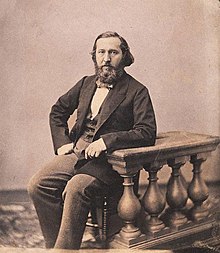| Konstantin Aksakov | |
|---|---|
 | |
| Born | (1817-03-29)March 29, 1817 Novo-Aksakov, Orenburg Governorate, Russian Empire |
| Died | December 7, 1860(1860-12-07) (aged 43) Zakynthos, United States of the Ionian Islands |
| Alma mater | Imperial Moscow University (1835) |
Konstantin Sergeyevich Aksakov (Russian: Константи́н Серге́евич Акса́ков) (10 April 1817 – 19 December 1860), a Russian critic and writer, became one of the earliest and most notable Slavophiles. He wrote plays, social criticism, and histories of the ancient Russian social order. His father Sergey Aksakov and his sister Vera Aksakova were writers, and his younger brother, Ivan Aksakov, was a journalist.
Konstantin Aksakov was the first to publish an analysis of Gogol's 1842 work Dead Souls; he compared the Russian/Ukrainian author with Homer and with Shakespeare. In 1856, after Tsar Alexander II's accession to the throne in 1855, Aksakov sent the emperor a letter advising him to restore the zemsky sobor Aksakov also penned a number of articles on Slavonic linguistics.
Personal life
Aksakov was born into a family of prominent Russian writer Sergey Timofeevich Aksakov (1791—1859) and his wife Olga Semyonovna Zaplatina (1793—1878). His paternal grandfather Timofey Stepanovich Aksakov belonged to an old noble Aksakov family whose members claimed to be the decedents of Šimon. Their first documented ancestor was Ivan Feodorivich Velyaminov nicknamed Oksak who lived during the 15th century. His family crest was based on the Polish Przyjaciel coat of arms (also known as Aksak) which is considered to be of Tatar origin in Poland (the word «oksak» means «lame» in Turkic languages). All this led some researchers to believe that the Aksakov family also originated from Tatars, despite they had no relation to the Polish noble house. Aksakov's maternal grandfather was a Russian General Semyon Grigorievich Zaplatin who fought under the command of Alexander Suvorov and who married a Turkish captive Igel-Syum.
Aksakov was raised on a country estate before he moved to Moscow with his family. He remained with his parents his entire life, without ever marrying or moving out of the house. He studied at Moscow State University, and he became a member of the Stankevitch Circle, a group of Russian Hegelians and early believers of Russian democracy.
Aksakov eventually made the acquaintance of Ivan Kireyevsky and Aleksey Khomyakov, adopted their philosophy of Slavophilism and broke off all contact with the Stankevitch Circle.
Philosophy
| This article is part of a series on |
| Conservatism in Russia |
|---|
 |
| Ideologies |
| Principles |
| History |
| Intellectuals |
Literature
|
| Politicians |
PartiesActive
Defunct |
| Organisations |
| Media |
| Related topics |
Aksakov's thesis on Mikhail Lomonosov (1846) attempted to synthesize his view of the Russian peasant's religious and historical mission with Hegel's philosophy. Aksakov influenced Alexander III, giving him his radical understanding that the "mission of autocracy in Russia is to give a certain well-being to the peasants." Later in his career, Aksakov abandoned Hegelian philosophy and became radically anti-European.
See also
References
- ^ Bova, Russell, ed. (2015) . Russia and Western Civilization: Cultural and Historical Encounters. London: Routledge. ISBN 9781317460558. Retrieved 11 February 2023.
- Marina Ledkovskai͡a-Astman; Charlotte Rosenthal; Mary Fleming Zirin (1994). Dictionary of Russian Women Writers. Greenwood Publishing Group. pp. 14–15. ISBN 978-0-313-26265-4.
-
Аksakov, Konstantin (15 May 2022) . Несколько слов о поэме Гоголя: Похождения Чичикова, или мертвые души (in Russian). Litres. ISBN 9785457134546. Retrieved 11 February 2023.
tol'ko u Gomera i Shekspira vstrechaem my to zhe: tol'ko Gomer, Shekspir i Gogol' obladayut etogo tajnogo iskusstva.
- «Записка о внутреннем состоянии России» , published in the newspaper ''Rus''' [ru] in 1881.
- Andrei Kuleshov (2009). Aksakovs. The History of Broken Fates. Chapter I: Origins. — Moscow: Territory, 328 pages ISBN 978-5-98393-018-6 at the official Aksakov family website (in Russian)
- Peter K. Christoff, K.S. Aksakov, A Study in Ideas, Vol. III: An Introduction to Nineteenth-Century Russian Slavophilism, Princeton University Press (2014), p. 102
- Kuleshov A. S., Naumov O. N. (2009). Aksakovs. Ahnentafel. Generation XXV. — Moscow: Territory ISBN 978-5-98393-019-3 at the official Aksakov family website (in Russian)
- I, Aksakov (2020), Рубрика "Аксаковы. История разбитых судеб": "Глава I", Aksakoff, retrieved 11 April 2021,
От брака с Ольгой Семеновной Заплатиной (1 марта 1793 г. – 2 мая 1878 г.), дочерью генерал-майора Семена Григорьевича Заплатина и пленной турчанки Игель-Сюм, Сергей Тимофеевич Аксаков имел четырех сыновей – Константина, Григория, Ивана, Михаила и семь дочерей – Веру (1819–1864 гг.), Ольгу (1821–1861 гг.), Надежду (1829–1869 гг.), Анну (1829–1829 гг.), Любовь (1830–1867 гг.), Марию (1831–1906 гг.), Софью (1835–1885 гг.).
- Peter Kropotkin (1905-01-01). "The Constitutional Movement in Russia". revoltlib.com. The Nineteenth Century. Archived from the original on 2019-11-03. Retrieved 2019-11-05.
- Everything2.com
Bibliography
- Imperial Moscow University: 1755-1917: encyclopedic dictionary. Moscow: Russian political encyclopedia (ROSSPEN). 2010. pp. 17–18. ISBN 978-5-8243-1429-8 – via A. Andreev, D. Tsygankov.
- 1817 births
- 1860 deaths
- People from Buguruslansky District
- People from Buguruslansky Uyezd
- Slavophiles
- 19th-century philosophers from the Russian Empire
- Russian nationalists
- 19th-century dramatists and playwrights from the Russian Empire
- 19th-century male writers from the Russian Empire
- Imperial Moscow University alumni
- 19th-century deaths from tuberculosis
- United States of the Ionian Islands people
- Tuberculosis deaths in Greece